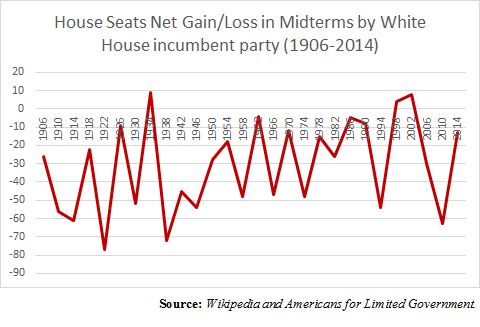As evidenced by the outcomes of both the Virginia gubernatorial race and the Alabama Senate special election, no matter what, Democrat voters are going to be extremely motivated in 2018 to take back Congress.
In Virginia, Ralph Northam beat Ed Gillespie by 234,000 votes, and by turning out 71 percent the amount of those who voted for Hillary Clinton in 2016. Republicans comparatively only turned out 66 percent the amount of those who voted for Donald Trump. To have won in Virginia, the GOP would have had to turn out nearly 80 percent of every person voted for Trump. There, suburban turnout for Gillespie was high, but in rural areas, it was depressed.
In Alabama, Doug Jones beat Roy Moore by a little less than 21,000 votes, and by turning out 92 percent the amount of those who voted for Hillary Clinton. That is uncanny. The GOP only turned out 49 percent of the amount of those who voted for Trump. It stands the reason, then, that a good number of Jones voters were actually cross-over voters. According to exit polls, 8 percent of Republicans who showed up in Alabama voted for Jones, while only 2 percent of Democrats voted for Moore. Jones also won independents 51 percent to 43 percent. The seat could have been saved with just 51 percent of those who voted for Trump. And enough did show up, but too many of them voted for Jones. Here, just the opposite phenomenon was in effect as in Virginia, suburban turnout for Moore was depressed while rural turnout was relatively elevated.
In both races, Democrats were highly motivated to turn out, and overall Republican turnout was depressed because it was divided.
Every election is a turnout affair, and the side that maximizes their turnout stands the best chance of winning. Democrats, lacking majorities in the House and the Senate, plus having lost the 2016 presidential election, have to do very little to motivate their side. They will call the 2018 races referenda on the GOP agenda, on the Trump agenda, whatever they need to sew the narrative for November.
The truth is, Democrats could say almost anything, because, again, being completely out of power, their supporters are frothing at the mouth to create a check against Republican rule. The message will be whatever wins the A/B split test.
That is because the current environment Republicans find themselves in is subject to an entirely predictable political cycle.
The White House incumbent party tends to lose House seats in midterm elections 89 percent of the time dating back a century, with losses averaging 35 seats. The exceptions were 1934, 1998 and 2002.
As a result, no matter what, it is a near certainty that Republicans will lose seats in the House, and there is a significant likelihood they will lose the majority if the losses are merely the average 35 seats from past cycles. Republicans only have a 21-seat majority at the moment.
On the Senate side, things are a little bit rosier. Nine seats up for election were in states that Trump carried in 2016: Florida, Indiana, Missouri, Montana, West Virginia, Wisconsin, Michigan, Pennsylvania, and Ohio.
However, if not even the Alabama Senate seat is safe, the Senate is very much in play in 2018. In addition to attempting to pick up seats, Republicans have to also defend seats in Arizona, Mississippi, Nebraska, Nevada, Tennessee, Texas, Utah, and Wyoming.
Certainly, then, losing the Jeff Sessions Senate seat in Alabama is a wake-up call for the Republican Party. The question is whether the GOP will take the wrong message from Virginia and Alabama, and enter into a panicked, every-man-for-himself, self-defeating attitude. Or whether they will hold their ranks whilst they maintain their majorities.
For, this is no time to panic.
Instead, it is time for Republicans to rally to President Trump and the agenda that won the election in 2016. That is, cut taxes, repeal Obamacare, appoint conservative judges, get better trade deals, slash regulations, curb illegal immigration and build the southern border wall. Also, no bad deals on DACA amnesty. The wall is not enough; chain migration has to be ended. So far, Republicans have not been all that impressive in the Congressional majority, and have thus far failed to pass a major agenda item via legislation, missing a once in a generation opportunity. Republicans have only had the White House, House, and Senate trifecta two other times since the Great Depression, in 1953-54 and 2003-06.
The GOP should also carefully analyze what made 1934, 1998 and 2002 exceptional. Those were the exceptions to the rule where the White House incumbent party actually picked up seats in the midterms.
Two were existential events — the Great Depression and 9/11 — which had dramatically altered the political landscape nationally. The first had Republicans being brought to the point of extinction, as the party got all of the political blame for the pervasive high unemployment of the 1930s depression.
The second, the al Qaeda attack on the World Trade Center and the Pentagon, brought a new atmosphere to Washington, D.C. Congress voted to authorize military force in Afghanistan in 2001 and again in Iraq in 2002. The election became a referendum on the war on terror broadly and specifically the votes on the Iraq war authorization, which many Democrats voted for, maximized Republican enthusiasm in the election and depressed Democrat turnout. Democrat attempts to stall legislation creating the Department of Homeland Security also played a role, with the GOP deftly portraying Democrats as obstructionists.
Specifically, in 2002, Republicans turned out 74 percent of the amount of those who voted for then-President George W. Bush in 2000. Democrats only turned out 66 percent of their base that voted for Al Gore.
1998 was when Independent Counsel Ken Starr was running around and Republicans were about ready to dial up impeachment charges on then-President Bill Clinton.
During that cycle, Republicans only turned out 68 percent of their base. Democrats only turned out 66 percent, but being roughly equal, they still managed to pick up 5 seats. In fact, it wasn’t even that Democrats had rallied to Clinton — their turnout was sufficiently depressed — it was that Republicans failed to get sufficiently motivated, or were turned off by the ongoing efforts to remove Clinton from office rather than governing.
If 2018 could have any corollaries to past episodes where the White House incumbent party actually picked up seats or at least did not lose the majority, it might be to 1998. This time, Democrats are whispering of impeachment, obsessed with Special Counsel Robert Mueller investigation into supposed Trump-Russia collusion in the 2016 election, and not addressing the issues of the American people.
So, how might Republicans change their fortunes? Besides enacting their agenda while they still have majorities — which is absolutely necessary and a no-brainer to motivate their base and to prove they are concerned with governing — they should turn their sights on the absolute politicization of the Justice Department, the FBI and the Special Counsel under Democrats.
The DNC and the Hillary Clinton campaign paid for the Fusion GPS-Christopher Steele dossier. Top Justice Department and FBI officials were tied to this dossier, which was presumably used to initiate a high-level national security investigation into the opposition party in an election year. And then, after they lost, they doubled down to tear down the incoming president, to destroy the new administration and to overturn the result of the election with trumped up, fake charges of being foreign agents.
So, Trump and the Congressional Republicans should make them pay. Big-time. Let it all out. The depth of the political corruption at the Justice Department and even at the National Security Council and the intelligence agencies that tried to interfere in the elections, help Democrats win and when that failed, to prosecute Trump officials. Clean house. Leave no stone unturned. Make sure everyone knows who was responsible. Demotions won’t cut it. People need to fired, and those engaged in misconduct, prosecuted. If public trust is not restored, the long-term consequences for the country could be cataclysmic. We cannot have two rules of law, one for Democrats where nobody is held accountable for their crimes, and one where Republicans are held accountable for crimes that were not even committed.
Hold up Section 702 reauthorization of the Foreign Intelligence Surveillance Act. And in the meantime, push for real reforms at these departments and agencies to prevent such political surveillance and abuses from ever occurring again. Appeal to a bipartisan sensibility against the dangers of politicization of intelligence and law enforcement, and the more Democrats fight it, the worse it will become for them.
As the crimes that were committed in the latter days of the become clear to the American people, Democrats in Congress running interference will become a part of the problem that needs solving in the minds of voters, particularly Republican voters, who can become united by the issue, thus altering the political landscape. It’s time to deliver the counter punch and to turn the tables.
To be effective in 2018, Republicans need to unite their party and give them a reason to be excited, as excited as Democrats currently are, and then give their opponents on the margins enough of a reason to stay home.
Then, upon reflection, Republican efforts to govern on the issues of real importance to Americans, that is, lower taxes, getting rid of as much of Obamacare as possible, less regulation, more jobs, law and order and secure borders, stand a chance of minimizing the damage in 2018. Then they can say, while Democrats were wasting time breaking the law looking for Boris, Natasha and the Russians at Trump Tower, President Trump and Republicans in Congress were working on behalf of the American people who elected them in 2016 to keep them safe and get the economy moving again.
There is no tomorrow. It’s time to govern.
Robert Romano is the Vice President of Public Policy at Americans for Limited Government.








